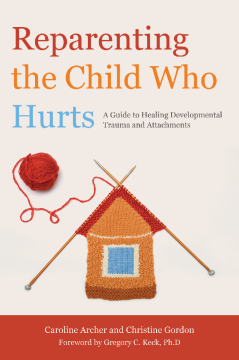
Additional Information
Book Details
Abstract
Finally, a parenting book which demystifies the latest thinking on neurobiology, physiology and trauma and explains what the research means for the everyday life of parents of children who hurt.
As experts on adoption and fostering who are adoptive parents themselves, Caroline Archer and Christine Gordon explain how this knowledge can help parents to better understand and care for their child. They explain why conventional parenting techniques are often not helpful for the child who has experienced early trauma and explore why therapeutic reparenting is the only way to help repair the unhealthy neurobiological and behavioural patterns which affect the child's development. They do not shy away from how difficult reparenting is, acknowledging how hard it can be to recognise our own fallibility as parents and to change our own parenting patterns. The authors also offer hard-won advice on a range of common parenting flashpoints - from defusing arguments and aggression to negotiating bedtimes and breaks in routine, and making sure that special occasions are remembered for all the right reasons.
Reparenting the Child Who Hurts is a humane, no-nonsense survival guide for any parent caring for a child with developmental trauma or attachment difficulties, and will also provide information and insights for social workers, teachers, counsellors and other professionals involved in supporting adoptive and foster families.
This book provides a useful resource full of relevant information for current adoptive parents and those who may be considering offering a home to a troubled child.
Young Minds Magazine
This book is full of enthusiasm, written by people passionate and knowledgeable about their subject. The content is excellent, and it is a thoughtful book full of wise and useful advice.
Youth in Mind
Caroline Archer and Christine Gordon have clearly researched the most recent literature in neuroscience, trauma, human development, and developmental parenting. [The book features] theoretically sound and well researched information presented in a manner that will be palatable to frustrated and challenged parents.It also provides explicit details of how parents may respond to difficult situations--complete with examples of verbal responses that may be helpful in ameliorating extremely intense situations.
Extracted from a foreword by Gregory C. Keck, Ph.D., Founder/Director of the Attachment and Bonding Center of Ohio; co-author of Adopting the Hurt Child, Parenting the Hurt Child, and author of Parenting Adopted Adolescents.
This exciting new book by the authors of "New Families, Old Scripts" starts from the latest findings on brain development from the field of neuroscience and how this information is central to understanding the principles of "developmentally reparenting" children who have experienced a traumatic start in their early life.
The book is both informative, presenting scientific information in an accessible format and instructive, giving countless practical examples and scenarios which can be used by parents and professionals alike.
The principles of "developmental reparenting" are spelt out throughout each chapter of the book. Adoptive parents and foster carers are encouraged to look at their own attachment history to make sense of their relationship with their children.
Readers are encouraged to "practice" changing their mindset to PARCEL (being playful, accepting, responsive, curious, empathetic and loving) when parenting traumatised children.
This book is a great resource for both parents who are parenting vulnerable traumatised children and those professionals who are supporting them.
Fiona Lettice, adoptive parent
Caroline Archer is an adoptive parent, an independent consultant in post-adoption support and a therapeutic parent mentor. She is also the bestselling author of First Steps in Parenting a Child who Hurts: Tiddlers and Toddlers 2nd Edition, Next Steps in Parenting a Child who Hurts: Tykes and Teens, and co-author (with Christine Gordon) of New Families, Old Scripts: A Guide to the Language of Trauma and Attachment in Adoptive Families. Christine Gordon is an adoptive parent with many years' experience of working with adoptive and foster families. She was a co-founder of Family Futures Consortium, London. Alongside her 'hands on' supportive role to parents, she is active in training and promoting the professional role of parent mentor as an integral part of the therapeutic team.
